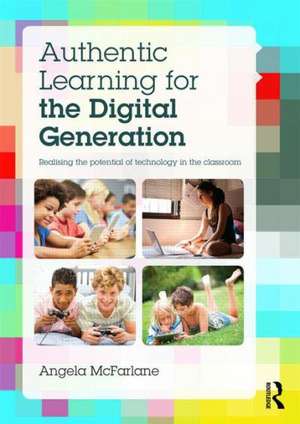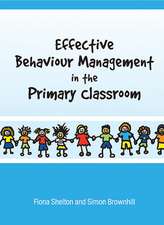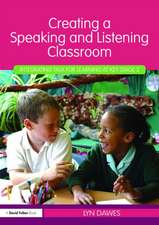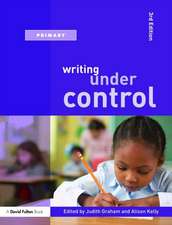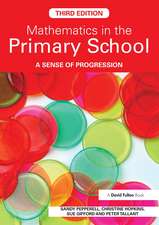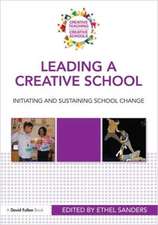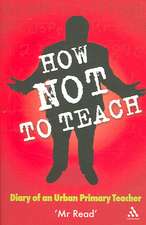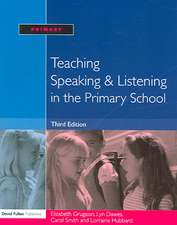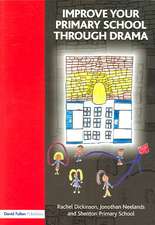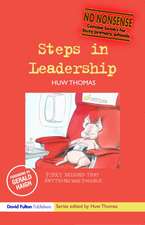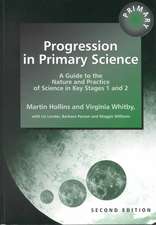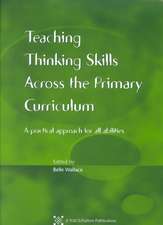Authentic Learning for the Digital Generation: Realising the potential of technology in the classroom
Autor Angela McFarlaneen Limba Engleză Paperback – 31 iul 2014
Where does the responsibility lie to prepare young people to be active and successful cybercitizens?
Can we go on confiscating pupils’ smartphones indefinitely?
Authentic Learning for the Digital Generation is a vital examination of young people’s use of personal devices, online creative communities and digital gaming. It calls into question the idea of the ‘digital native’ and shows clearly that the majority of young users need help and support in order to benefit from the rich learning potential of personal, mobile and online technology use.
Written by a leading authority on the role of digital technologies in education, it looks in detail at the practice and implications of learning using personal devices, collaborative online spaces, learning platforms, user generated content and digital games. In particular, approaches to solving problems, building knowledge, manipulating data and creating texts are examined. It offers clear strategies, a vision for what effects on learning we might reasonably expect when children are given access to different types of technology, and explores the challenges of managing these practices in the classroom.
Authentic Learning for the Digital Generation offers careful analysis at a time when there is much discussion about young people emerging from school unprepared for the world of work and often struggling to manage their personal relationships as they are exposed to strong content and harsh criticism online. It considers what we know of childhood experience in a digital world and offers ways in which schools and teachers can embrace the opportunity presented by ubiquitous ownership of connected, digital devices to enrich and deepen learning.
| Toate formatele și edițiile | Preț | Express |
|---|---|---|
| Paperback (1) | 350.46 lei 6-8 săpt. | |
| Taylor & Francis – 31 iul 2014 | 350.46 lei 6-8 săpt. | |
| Hardback (1) | 763.39 lei 6-8 săpt. | |
| Taylor & Francis – 8 aug 2014 | 763.39 lei 6-8 săpt. |
Preț: 350.46 lei
Nou
Puncte Express: 526
Preț estimativ în valută:
67.06€ • 70.20$ • 55.49£
67.06€ • 70.20$ • 55.49£
Carte tipărită la comandă
Livrare economică 07-21 aprilie
Preluare comenzi: 021 569.72.76
Specificații
ISBN-13: 9781138014114
ISBN-10: 1138014117
Pagini: 164
Ilustrații: 6 black & white illustrations, 4 black & white tables, 3 black & white halftones, 3 black & white line drawings
Dimensiuni: 174 x 246 x 10 mm
Greutate: 0.32 kg
Ediția:1
Editura: Taylor & Francis
Colecția Routledge
Locul publicării:Oxford, United Kingdom
ISBN-10: 1138014117
Pagini: 164
Ilustrații: 6 black & white illustrations, 4 black & white tables, 3 black & white halftones, 3 black & white line drawings
Dimensiuni: 174 x 246 x 10 mm
Greutate: 0.32 kg
Ediția:1
Editura: Taylor & Francis
Colecția Routledge
Locul publicării:Oxford, United Kingdom
Public țintă
Postgraduate, Professional Practice & Development, and UndergraduateCuprins
1. The digital learning landscape 2. Devices and desires 3. Public spaces 4. Collaborative Places 5. Solving problems, building knowledge 6. User generated content 7. Games and play 8. Thinking about writing 9. Manipulating data, seeing patterns 10. Looking to the horizon
Recenzii
'This is a timely bringing together of the key factors around technology enhanced learning. As policy makers are finally waking up to the potential for teachers to amplify their impact with technology, Angela McFarlane is rigorous in her approach to the debate. She successfully shows what works and what to look out for, and leads us to how the latest thinking can really transform teaching.'
Lord Jim Knight, Visiting Professor, London Knowledge Lab, UK
'Angela's book provides a fresh take on the core issues facing researchers and educators when integrating technology into the curriculum. She argues strongly that support for children's learning with technologies must go beyond an "if you build it they will learn" mentality. Her ideas for supporting learning with technologies have practical implications for parents and schools as well as important findings for academics and policy makers in designing for learning.'
Professor Danaë Stanton Fraser, Department of Psychology, University of Bath, UK
Lord Jim Knight, Visiting Professor, London Knowledge Lab, UK
'Angela's book provides a fresh take on the core issues facing researchers and educators when integrating technology into the curriculum. She argues strongly that support for children's learning with technologies must go beyond an "if you build it they will learn" mentality. Her ideas for supporting learning with technologies have practical implications for parents and schools as well as important findings for academics and policy makers in designing for learning.'
Professor Danaë Stanton Fraser, Department of Psychology, University of Bath, UK
Descriere
Authentic Learning for the Digital Generation is a vital examination of young people’s use of personal devices, online creative communities and digital gaming. It calls into question the idea of the ‘digital native’ and shows clearly that the majority of young users need help and support in order to benefit from the rich learning potential of personal, mobile and online technology use.
Authentic Learning for the Digital Generation offers careful analysis at a time when there is much discussion about young people emerging from school unprepared for the world of work and often struggling to manage their personal relationships as they are exposed to strong content and harsh criticism online. It considers what we know of childhood experience in a digital world and offers ways in which schools and teachers can embrace the opportunity presented by ubiquitous ownership of connected, digital devices to enrich and deepen learning.
Authentic Learning for the Digital Generation offers careful analysis at a time when there is much discussion about young people emerging from school unprepared for the world of work and often struggling to manage their personal relationships as they are exposed to strong content and harsh criticism online. It considers what we know of childhood experience in a digital world and offers ways in which schools and teachers can embrace the opportunity presented by ubiquitous ownership of connected, digital devices to enrich and deepen learning.
